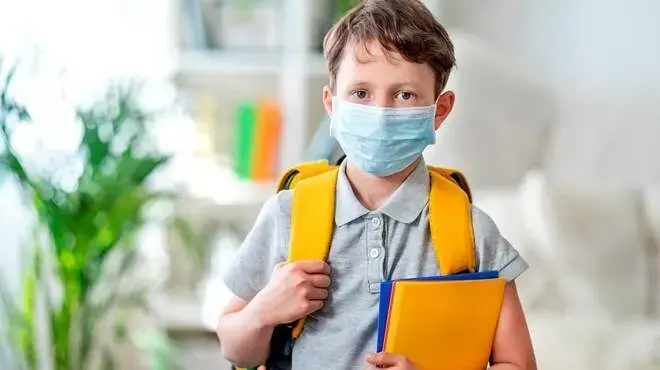- Home
- Medical news & Guidelines
- Anesthesiology
- Cardiology and CTVS
- Critical Care
- Dentistry
- Dermatology
- Diabetes and Endocrinology
- ENT
- Gastroenterology
- Medicine
- Nephrology
- Neurology
- Obstretics-Gynaecology
- Oncology
- Ophthalmology
- Orthopaedics
- Pediatrics-Neonatology
- Psychiatry
- Pulmonology
- Radiology
- Surgery
- Urology
- Laboratory Medicine
- Diet
- Nursing
- Paramedical
- Physiotherapy
- Health news
- Fact Check
- Bone Health Fact Check
- Brain Health Fact Check
- Cancer Related Fact Check
- Child Care Fact Check
- Dental and oral health fact check
- Diabetes and metabolic health fact check
- Diet and Nutrition Fact Check
- Eye and ENT Care Fact Check
- Fitness fact check
- Gut health fact check
- Heart health fact check
- Kidney health fact check
- Medical education fact check
- Men's health fact check
- Respiratory fact check
- Skin and hair care fact check
- Vaccine and Immunization fact check
- Women's health fact check
- AYUSH
- State News
- Andaman and Nicobar Islands
- Andhra Pradesh
- Arunachal Pradesh
- Assam
- Bihar
- Chandigarh
- Chattisgarh
- Dadra and Nagar Haveli
- Daman and Diu
- Delhi
- Goa
- Gujarat
- Haryana
- Himachal Pradesh
- Jammu & Kashmir
- Jharkhand
- Karnataka
- Kerala
- Ladakh
- Lakshadweep
- Madhya Pradesh
- Maharashtra
- Manipur
- Meghalaya
- Mizoram
- Nagaland
- Odisha
- Puducherry
- Punjab
- Rajasthan
- Sikkim
- Tamil Nadu
- Telangana
- Tripura
- Uttar Pradesh
- Uttrakhand
- West Bengal
- Medical Education
- Industry
Children should not be forced to wear face masks, recommends JAMA study

Many governments recommend face masks for children during the ongoing COVID-19 pandemic but the evidence base is weak for this recommendation. Walach et al have assessed the carbon dioxide content in exhaled air and found that most of the complaints reported by children could be linked to hypercapnia.
Researchers conducted a randomized controlled trial which included children aged 6 -17 years constituting 20 girls and 25 boys. In this experimental study carbon dioxide content was measured in inhaled and exhaled air with and without 2 types of masks( N95 and surgical mask). A 3-minute continuous measurement was taken for baseline carbon dioxide levels without a face mask. A 9-minute measurement for each type of mask was allowed: 3 minutes for measuring the carbon dioxide content in joint inhaled and exhaled air, 3 minutes for measuring the carbon dioxide content during inhalation, and 3 minutes for measuring the carbon dioxide content during exhalation.
Major findings of the study are:
- The pretest baseline CO2 level was found 268 ppm with a range of 100-628ppm.
- Upon analysis it was found that CO2 level in inhaled air with surgical mask was 1312 ppm and with N95 mask was 1391 ppm.
- The youngest children had the highest values, with one 7-year-old child's carbon dioxide level measured at 25000 ppm.
- Carbon dioxide content of joint exhaled and inhaled air with surgical mask was found to be 2650ppm and with N95 mask was found to be 2677 ppm
- Exhaled air had significantly high CO2 level with any type of mask with mean value being 3847ppm.
Also from the study researchers found that the value of the child with the lowest carbon dioxide level was 3-foldgreater than the limit of 0.2 % by volume(which is recommended upper limit for closed rooms).
In the dead space volume of the masks, which collects exhaled carbon dioxide quickly for short and this carbon dioxide mixes with fresh air and elevates the carbon dioxide content of inhaled air under the mask, and this was more pronounced in this study for younger children.
Authors conclude-"We suggest that decision-makers weigh the hard evidence produced by these experimental measurements accordingly, which suggest that children should not be forced to wear face masks."
Source: Walach H, Weikl R, Prentice J, et al. Experimental Assessment of Carbon Dioxide Content in Inhaled Air With or Without Face Masks in Healthy Children: A Randomized Clinical Trial. JAMA Pediatr. Published online June 30, 2021. doi:10.1001/jamapediatrics.2021.2659
Dr Kamal Kant Kohli-MBBS, DTCD- a chest specialist with more than 30 years of practice and a flair for writing clinical articles, Dr Kamal Kant Kohli joined Medical Dialogues as a Chief Editor of Medical News. Besides writing articles, as an editor, he proofreads and verifies all the medical content published on Medical Dialogues including those coming from journals, studies,medical conferences,guidelines etc. Email: drkohli@medicaldialogues.in. Contact no. 011-43720751


